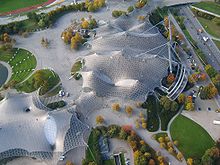MTV Europe Music Awards 2007
The 14th Europe Music Awards of the music broadcaster MTV took place on November 1st, 2007 in the Olympiahalle in Munich , for the third time after Berlin and Frankfurt am Main in Germany . It was also the last major event that took place in the hall before the renovation. In addition to Brussels , Eastern European cities such as Bucharest and Warsaw were also considered other applicants for the award location. The award ceremony was moderated by the US rapper Snoop Dogg .
New dialing system
In addition to a new category called New Sound of Europe, with which an artist or a band from Europe is chosen, there is also a new dialing system this year. The viewers can only choose their “favorite” from up to 40 artists per category. The five artists or bands with the most votes will be officially nominated for the award ceremony. Now the next round of voting begins in which the candidate with the most votes receives the award. In addition, similar to the MTV Video Music Awards , the categories will be given new names. Another new feature is the Artist's Choice category , in which the stars choose their winners.
Presenters
- Boris Becker
- Lily Cole
- Craig David
- Didier Drogba
- Nelly Furtado
- Dave Gahan
- Dave Grohl
- Lewis Hamilton
- Taylor Hawkins
- Jon Heder
- Killer Kela
- Jens Lehmann
- Jared Leto
- Benji Madden & Joel Madden
- Eva Padberg
- Franka Potente
- Kelly Rowland
- Samy Deluxe
- Joss Stone
- Michael Stipe
- Sun ("China Wine")
- Serj Tankian
- Paul van Dyk
- Wyclef Jean
Awards
The winners in the respective categories are shown in bold .
Rock out
Ultimate Urban
tape
Most addictive track
- Avril Lavigne - Girlfriend
- Rihanna - Umbrella
- Mika - Grace Kelly
- Amy Winehouse - Rehab
- Nelly Furtado - All Good Things (Come to an End)
- Beyoncé ft. Shakira - Beautiful Liar
Headliners
album
- Linkin Park - Minutes to Midnight
- Akon - Convicted
- Avril Lavigne - The Best Damn Thing
- Nelly Furtado - Loose
- Amy Winehouse - Back to Black
solo
Inter Act
Video star
is elected by MTV
- Foo Fighters - The Pretender
- Justin Timberlake - What Goes Around ... Comes Around
- Chemical Brothers - Salmon Dance
- Kanye West - Stronger
- Bat for Lashes - What's a Girl to Do
- Justice - DANCE
Artist's Choice
New Sounds of Europe finalists
Regional awards
The winners in the respective categories are shown in bold .
Germany
- Bushido
- Sido (voluntarily canceled)
- Beatsteaks
- July
- Sports fans Stiller
Croatia, Slovenia, Bosnia-Herzegovina, Serbia, Macedonia, Montenegro ("MTV Adria")
Baltic states
Denmark
Netherlands and Belgium
Finland
France
Italy
Norway
Poland
Portugal
Romania
Russia
Spain
Sweden
Turkey
Great Britain & Ireland
Africa
Arabia
Hungary
Ukraine
Performances
- Mika
- Foo fighters
- My Chemical Romance
- Avril Lavigne
- will.i.am and Nicole Scherzinger (duet)
- Tokio Hotel
- Babyshambles
- Amy Winehouse
- Bedwetters
criticism
November 1st is the catholic solemn festival of All Saints , a public holiday in Bavaria . The law on the protection of Sundays and public holidays in the Free State refers to this festival as a silent day in Article 3 . Paragraph 2, sentence 1 of the article states: On the quiet days, public entertainment events are only permitted if the serious nature of these days is preserved. The Archdiocese of Munich and Freising has therefore criticized the approval of this event because, in their opinion, it should not have been granted. The Bavarian Ministry of the Interior is now also dealing with the matter.

